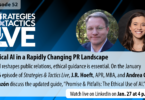Have you ever encountered a colleague or acquaintance you never thought was particularly bright and suddenly they’re churning out thought leadership pieces that position them as industry gurus? Ever wonder who flipped the switch in their brain to inspire them to produce those pieces that just don’t sound like anything they could say in person?
As social media continues to explode, so does the number of thought leaders and the number of posers, or those who aren’t really thought leaders at all. They’re just good at searching the Internet for others’ brilliant ideas and passing them off as their own. What gets me is that many of these successful executives really don’t need to do this to get attention. Those who don’t know better might not realize they’re just recycling information they read somewhere else and repurposing it under their own byline, claiming they’re a subject expert.
This, my friends, is called plagiarism, and it doesn’t just happen online. It occurs in the classroom, group presentations, meetings and anywhere ideas are shared.
A plagiarist can think they’re getting away with it as long as the original author or owner of the work doesn’t catch on that their work or ideas have been stolen. Eventually the one plagiarizing is going to get caught. It’s against the law. It’s fraud.
Our PRSA Code of Ethics says it’s just plain wrong and violates at least four Code provisions and three professional values.
According to the PRSA Board of Ethics and Professional Standards (BEPS) Advisory PS-16, “Plagiarism is an all too frequent practice that involves the unauthorized use or close imitation of the language and thoughts of another author and the representation of them as one’s own original work. The user fails to make any attempt to attribute the work. Plagiarism can be treated as fraud or theft of intellectual property.”
Think about it. We all know better than to violate someone’s copyright. But plagiarism? Do you really know what it is and do you really understand it?
There’s a plagiarism scenario on the new online ethics quiz that will give you a deeper understanding. With September being Ethics Month, it’s the perfect time to take the online ethics quiz and refresh your memory of our Code of Ethics. It’s fun, free, and completely confidential.
Marisa Vallbona, APR, Fellow PRSA, serves on the PRSA Board of Directors and is president of CIM Incorporated, a Southern California-based public relations firm with offices in Los Angeles and San Diego.







Great post, Marisa. Hope you are doing well! 🙂
Hi Marisa! And I’m totally reposting this in hopes people even outside of PRSA get the hint!
Marisa, co-sign everything you’re written here. Thank you for speaking up on this topic. It might be harsh but it’s true. There ARE a whole lot of pretenders out there.